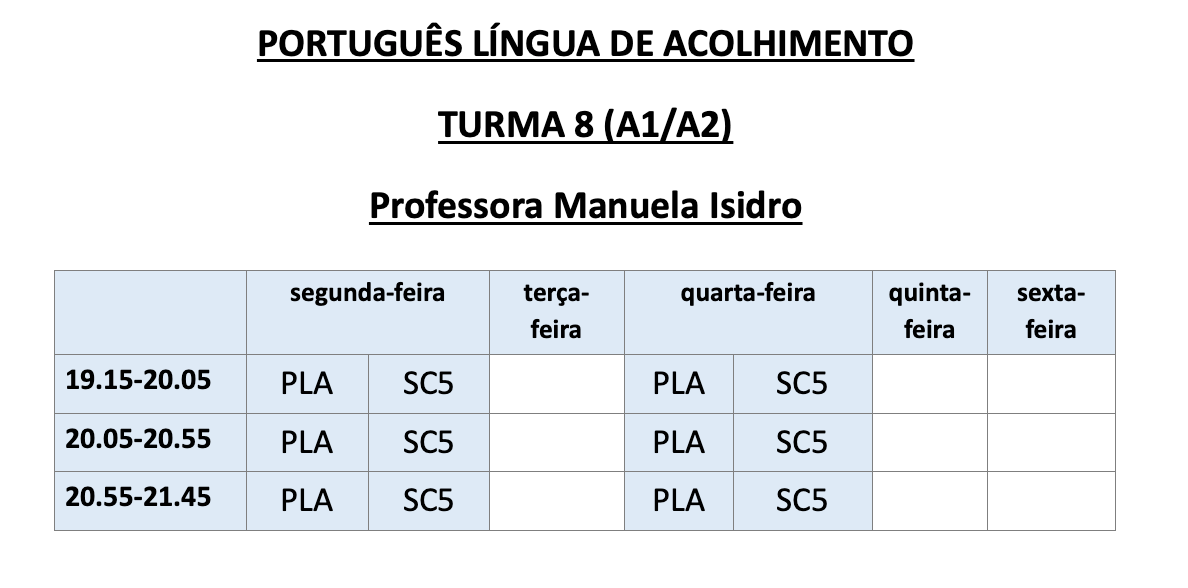I get so many emails from folks wanting to know more about how we are coming along with our Portuguese language skills. And many ask us about free resources. Today I write about what might be the best way to learn Portuguese for free.
Portugal Offers Free Language Classes
We learned from a couple we met in Lisbon that Portugal offered free language classes to immigrants. They had taken the classes in Lisbon and passed their final exam. This gave them an A1/A2 certificate that is required for Portuguese citizenship. When I learned their final exam was written and did not require them to speak to a native to pass, I was all in. While learning any new language is challenging…in my experience speaking Portuguese is more difficult than reading/writing Portuguese.
So once we got settled in VRSA we looked to see if such courses were offered in our small town. We learned they were and would start again with the new school year. In August we signed up for the course, along with several of our American friends in town. We were told that the course enrollment was unusually large and that we might be placed on a waitlist but regardless we would receive an email in a few weeks.
In mid-September, I returned to VRSA high school as we had not yet gotten an email regarding the course. The receptionist I spoke to said she would inquire, and went into a glass conference room where a man surrounded by paper sat hunched over a laptop. When she spoke with him, he started throwing papers in the air and gesturing frantically. She returned to me and said, “He is not ready yet. We will let you know soon.”
So imagine my surprise when on 10 November Denise and I got an email asking us to attend a “class” on Monday, 14 November at 19:15. Our WhatsApp chat started pinging as our friends in town received the same email. With paper and pens in hand, we dutifully went to the high school on Monday evening. Classes, I assumed, had already begun…the 30 or so of us in attendance must be on the waitlist. But we were not there to take a class…instead, we were asked to take a test. The assumed the test would determine which class we were slotted into.1
The Test
Part of me wanted to show how much I had learned…part of me wanted to turn in a totally blank test so I was placed in the lowest A1 class. Of course, while Denise is far ahead of me in vocabulary…we wanted to be in the same class.2 But we both gave it the old college try.
The instructors passed out 6 or 7 double-sided pages. They began by reading us text twice which provided the answers to multiple choice questions on the page. Frankly, this was pretty easy…they spoke slowly!
Then there was a section of paragraphs that somehow corresponded to people. Frankly, this whole section confused me and I left it blank. There was a section in which you were to conjugate the verb in the present tense. Then a section that asked you to conjugate in the future and past. I only conjugate in the present…
There was a section that related to a scientific journal article about a fossil found in Argentina…or at least I think it was Argentina. Again, you had to answer questions based on the information in the article. The final part of the test asked you to write a letter to a friend about your life in Portugal: where you were from, when you arrived, what you do, how you like the weather…etc.
After an hour or so, I was toast. A friend was also done but didn’t want to be the first to turn in his paper. I didn’t care…so up I went. When I turned in the test I asked if Denise and I could be in the same class. One of the instructors said yes, and put a “1” next to both of our names. Please God, let this be the A1 class!
Portugal for All
Since I am writing a post about our experience, I felt it necessary to do some research into this program. I learned it is called “Portugal for All” and has been offered since 2008. Over 92,000 students have enrolled to date:
The mastery of the language allows better interaction with the community, facilitates insertion in the labor market and the claim of social rights. To take part in the Portuguese language course offered free of charge by the High Commissioner for Migration (ACM), just contact the Migrant Support Line (808 257 257/fixed network and 218 106 191/mobile network) to find out which unit is the most near your home or work area. The Portuguese for All (PPT) program is aimed at foreign citizens living in Portugal, that is, third-country nationals, community members, refugees, asylum seekers or Portuguese descendants. — Lisboa Acolhe
I learned the program is co-funded by the EU (i.e. the European Social Fund) and promotes an important purpose (beyond just ordering a meal or getting support from your home wifi provider):
The migration of people, in the overwhelming majority of cases for reasons related to the search for work and better living conditions, is a constituent element of contemporary societies…As of recent, the issue of integration has made systematically more frequent appearances in the European political and public debate on immigration…
Knowing the language of the host country is not only a necessary and indispensable condition to be autonomous, it is also, and above all, a condition of personal, family, cultural and professional development. Their ignorance constitutes an inequality that weakens people, making them dependent and therefore more vulnerable. Being able to learn the language of the host country is to be able to acquire the means of communicating, interacting, understanding, defending oneself, confronting another culture and other codes, and being able to choose to open oneself to others. It is necessary to speak, understand, read, write in Portuguese to access the labour market, find accommodation, ask for permission to stay in the country, be able to follow the schooling of children, access health care, understand and participate in social life, politics and cultural. One must be proficient in Portuguese to act in Portugal, exercising a full and conscious citizenship. — inno-val.eu
Of course, Portugal has welcomed many Ukrainian refugees, and language skills are critical to their ability to work in Portugal. Of the 30 or so people who attended the “test session” we attended, I would say 25 were adults working or seeking employment in Portugal.
Our First Real Class
I started writing this post the evening after our “test class”.3 I had hoped that I would have attended at least one class before the publication 10 days later…though frankly, I didn’t hold out a lot of hope. But as it turns out on Monday, 21 November we received an email stating we would begin on Wednesday. It would appear we are in the Monday-Wednesday class, from 19:15-21:45. There were 13 of us in attendance (5 Americans, 2 Brits, 4 people from India, and 2 from Ukraine.4)
Our first class was Ótimo! (Great) Though much of it was a review for Denise and me, it did answer quite a few questions we have had for some time. Our instructor is fabulous…funny, engaging, encouraging, and intuitive! We came away feeling we can actually learn this language and that it will be fun.
We also learned that we were not “slotted in” but rather this is a new class and we are starting from the beginning. Yeah! Of course, this means that instead of ending in May, this class will go until July. We already have a few trips planned and will miss a few classes. But I guess over 8 months that is to be expected.
Other Options
If you have not yet moved to Portugal and want to get a head start (which is recommended) check out these free apps. If you want to learn why there were color-coded sticky notes on everything in our apartment, read this post. I have also shared some of our language-learning misadventures. And don’t forget YouTube…there are lots of great options there to get you started.
Next Week: building progress report and what you get for the money.
I was instantly reminded of the blue jay, robin, and wren reading groups we were assigned in first grade. At that time I was in the wren group. They called it wren…rather than “needs a lot of help!” …because they didn’t want me to feel bad or impose some self-fulfilling prophecy. But I still knew! I was very much hoping to be placed in the wren Portuguese class.
Classes are twice a week (either Monday, Wednesday, or Tuesday, Thursday) for 2+ hours a night. Having all our weeknights consumed with classes would cramp our social life.
We learned that the “test class” was not to slot us in. We would be starting from the beginning. When we asked why we were asked to take the test we were told, “We do it.”
I felt bad for the 2 Ukrainians as the instructor speaks English and Portuguese. The one woman seemed to understand a little English. The other woman did not.








Good luck with the classes. I was fortunate to get a slot in one of three M/W evening classes here in my neighborhood of Porto. Many of the students are able to speak and understand Portuguese already, even in an A1 level class. Thankfully, our instructor takes pity on the few of us who cannot and offers some commentary in English. While the majority of class time is focused on a structured study of the language, we have had a smidge of culture interwoven into the program including background on some of the holidays, songs and poetry played in class, and a combined classes Magusto party with a dedicated chestnut roaster. As good as the program is, I need to supplement it with a robust self-study to build vocabulary and some level of listening comprehension and as scary as it seems, make a solid effort to speak Portuguese when I am out and about. We are truly blessed to have such encouragement from the Portuguese.
Thanks again for an informative post. I am again reminded of the Indian parable (no, not you Tonto) of the three blind men trying to describe an Elephant by touching different part of it. I don’t mean to throw shade on your detailed description of your experience, but like all things Portuguese, expat experiences vary wildly with this program. Here in the University city of Coimbra, let’s just say it makes me think you are truly blessed to be in the course that you are taking,. Boa Sorte!